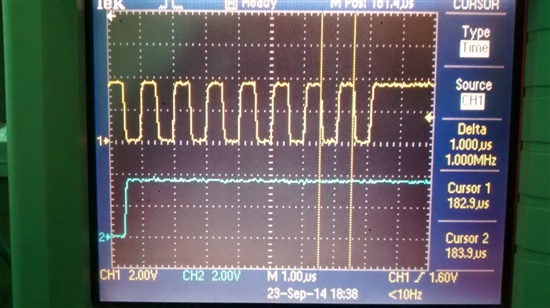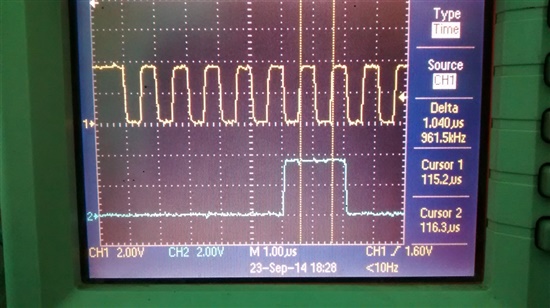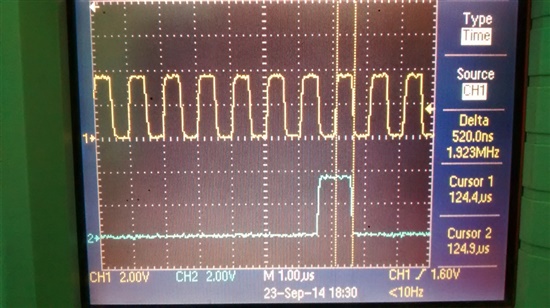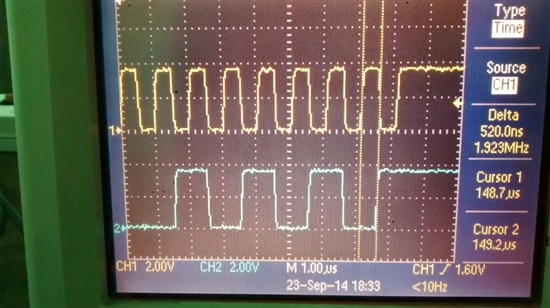Hello,
We are interfacing AT25128B EEPROM with MSP430G2553 launchpad board over SPI. We are using CCS version 5.1 to develop our code.
We are trying to write a data on one location and read from same location to test EEPROM. But we didn't get same value after reading that same location. We always get 0xFF or 0x00 value after reading that location. Our SPI configuration is clock 1 MHz and mode 3. We have also checked with SPI mode 0 but same problem occured. We have captured waveforms of SPI clock and MOSI pins and noted that all sequences are correct. I have attached our code and waveforms here.
Please look at my code and make a suggestion as what the problem might be, I would greatly appreciate it.
/*
*
* SPI Connections:
* CS - P1.4 (Active Low)
* SCLK - P1.5
* MOSI - P1.7
* MISO - P1.6
*
* UART TX: P1.1
* UART RX: P1.2
*
*/
#include <msp430.h>
#include "uart.h"
//opcodes
#define WREN 6
#define WRDI 4
#define RDSR 5
#define WRSR 1
#define READ 3
#define WRITE 2
#define DLY 80000 // 5 MS
#define DATA 0x55
char recv_data;
void spi_write(char byte)
{
UCB0TXBUF = byte;
while (!( IFG2 & UCB0TXIFG));
}
char spi_read(void)
{
while (!(IFG2 & UCB0RXIFG)); // USCI_b0 RX Received?
return(UCB0RXBUF);
}
void write_enable(void)
{
P1OUT &= ~BIT4; // Enable Device
_delay_cycles(DLY);
spi_write(WREN);
_delay_cycles(DLY);
P1OUT |= BIT4; // Disable Device
}
void write_disable(void)
{
P1OUT &= ~BIT4; // Enable Device
_delay_cycles(DLY);
spi_write(WRDI);
_delay_cycles(DLY);
P1OUT |= BIT4; // Disable Device
}
void isDeviceReady(void)
{
char status;
P1OUT &= ~BIT4; // Enable Device
//_delay_cycles(DLY);
spi_write(RDSR);
spi_write(0xFF);
status = spi_read();
uart_put(status); // Debug point - Send Status register value on UART
P1OUT |= BIT4; // Disable Device
//_delay_cycles(DLY);
while(status & 0x01); // Wait to complete write cycle
}
void eeprom_write(void)
{
write_enable(); // Enable Write cycle
P1OUT &= ~BIT4; // Enable Device
_delay_cycles(DLY);
spi_write(WRITE);
spi_write(0x00); // MSB Address
spi_write(0xAA); // LSB Address
spi_write(DATA); // Data
P1OUT |= BIT4; // Disable Device
isDeviceReady();
_delay_cycles(DLY);
write_disable(); // Disable write
}
char eeprom_read(void)
{
char ch = 1;
P1OUT &= ~BIT4; // Enable Device
_delay_cycles(DLY);
spi_write(READ);
spi_write(0x00); // MSB Address
spi_write(0xAA); // LSB Address
spi_write(0xFF); // Dummy data
ch = spi_read();
uart_put(ch); // Debug point
P1OUT |= BIT4; // Disable Device
_delay_cycles(DLY);
return(ch);
}
void clockConfig(void)
{
// configure the CPU clock (MCLK)
// to run from DCO @ 16MHz and SMCLK = DCO / 4
BCSCTL1 = CALBC1_16MHZ; // Set DCO
DCOCTL = CALDCO_16MHZ;
BCSCTL2= DIVS_2 + DIVM_0; // divider = 4 for SMCLK and 1 for MCLK
}
void spi_init(void)
{
// set the pin mode 3 for pins 5,6 & 7 of port 1 (USCI mode)
P1SEL |= BIT5 + BIT6 + BIT7; // low bit = 1 for pins 5,6 and 7 BIT 3 is 0 (CS via GPIO)
P1SEL2 |= BIT5 + BIT6 + BIT7; // high bit = 1 for pins 5,6 and 7 BIT 3 is 0 (CS via GPIO)
P1DIR |= BIT4; // p1.4 set to output to drive CS
P1OUT |= BIT4; // pull p1.4 to high - CS high -> chip is disabled
UCB0CTL1 = UCSWRST;
// synchronous (=SPI) master 3 wire SPI, clock polarity HIGH at Idle
// SPI mode 3
UCB0CTL0 |= UCCKPL | UCMST | UCSYNC | UCMSB | UCMODE_0;
UCB0CTL1 |= UCSSEL_2; //use SCLK : 4MHz
// set baud rate = SMCLK, divide by 2
UCB0BR0 = 0x04; // SPI clock : 1 MHz
UCB0BR1 = 0;
UCB0CTL1 &= ~UCSWRST; // ** Initialize USCI **
}
void uart_init(void)
{
P1SEL |= RXD + TXD ; // P1.1 = RXD, P1.2=TXD
P1SEL2 |= RXD + TXD ; // P1.1 = RXD, P1.2=TXD
UCA0CTL1 = UCSWRST; // reset
UCA0CTL1 |= UCSSEL_2; // SMCLK
UCA0BR0 = 0xA0; // 9600 baud rate
UCA0BR1 = 0x01;
UCA0MCTL = UCBRS2 | UCBRS1;
UCA0CTL1 &= ~UCSWRST; // **Initialize USCI state machine**
}
void uart_put(char byte)
{
UCA0TXBUF = byte;
while (!( IFG2 & UCA0TXIFG));
}
/*
* main.c
*/
int main(void)
{
WDTCTL = WDTPW | WDTHOLD; // Stop watchdog timer
clockConfig();
uart_init();
spi_init();
// Set LED Direction
P1DIR |= BIT0;
P1OUT |= BIT0;
uart_put('A');
// Write EEPROM
eeprom_write();
// Read EEPROM
recv_data = eeprom_read();
// Check received data is same as written data
if(recv_data == DATA)
{
P1OUT &= ~BIT0;
}
else if(recv_data == 0xFF)
{
P1OUT |= BIT0;
}
else
{
P1OUT ^= BIT0;
}
while(1)
{
}
}
Thanks,
Nipam






